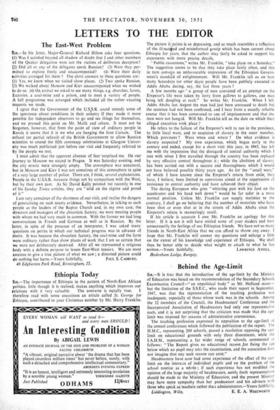LETTERS TO THE EDITOR
The East-West Problem
ISJR,—In his letter, Major-General Richard Hilton asks four questions. (1) Was I satisfied beyond all shadow of doubt that I and other members of the Quaker delegation were not the victims of deliberate deception? /2) Did all or any of the delegates speak Russian? (3) Were they per- mitted to explore freely and unaccompanied? (4) Were their daily activities arranged for them ? The short answers to these questions are: II) Yes, we knew when we visited show places. (2) Two spoke Russian. k3) We walked about Moscow and Kiev unaccompanied when we wished (to do so. (4) On arrival we asked to see many things, e.g. churches, farms, factories. a coal-mine and a prison, and to meet a variety of people. A full programme was arranged which included all the rather exacting requests we made.
I agree that the Government of the U.S.S.R. could remedy some of the ignorance about conditions in their country if they made it more possible for independent observers to go and see things for themselves, and we pressed this point on Mr. Malik and others. It must not be forgotten, however, that from the point of view of ordinary people in Russia it seems that it is we who are hanging the lion Curtain. The -refusal (or partial refusal) of the British Government to allow Russian scientists to attend the fifth centeaaW celebrations at Glasgow Univer- sity was much publicised just before our visit and frequently referred to by the people we met.
I must admit that the apparent absence of fear surprised me. On our journey to 'Moscow we stayed in Prague. It was Saturday evening, and the city streets were strangely empty. The atmosphere was unnatural, but in Moscow and Kiev I was not conscious of this atmosphere in spite of a very large number of police. There are, I think, several explanations. People in the U.S.S.R. measure things not by comparison with the West, but by their own past. As Sir David Kelly pointed out recently in one of his Sunday Times articles, they are "sold on the regime and proud of it" I am very conscious of the shortness of our visit, and realise the dangers of generalising on such scanty evidence. Nevertheless, in talking to such people as the leaders of the Baptist Church and, in my own case, the directors and managers of the chocolate factory, we were meeting people with whom we had very much in common. With the former we had long conversations in French and German as well as in Russian. By the latter, in spite of the presence of an interpreter, I was asked many questions on points in which our technical progress was in advance of theirs. It was because the chocolate factory, the coal-mine and the farm were ordinary rather than show places of work that I am so certain that we were not deliberately deceived. After all we represented a religious body with a definite purpose to lessen East-West tension. We are most anxious to give a true picture of what we saw ; a distorted picture could do nothing but harm.—Yours faithfully, PAUL S. CADBURY. 46 Edgbaston Park Road, Birmingham, 15.


































 Previous page
Previous page